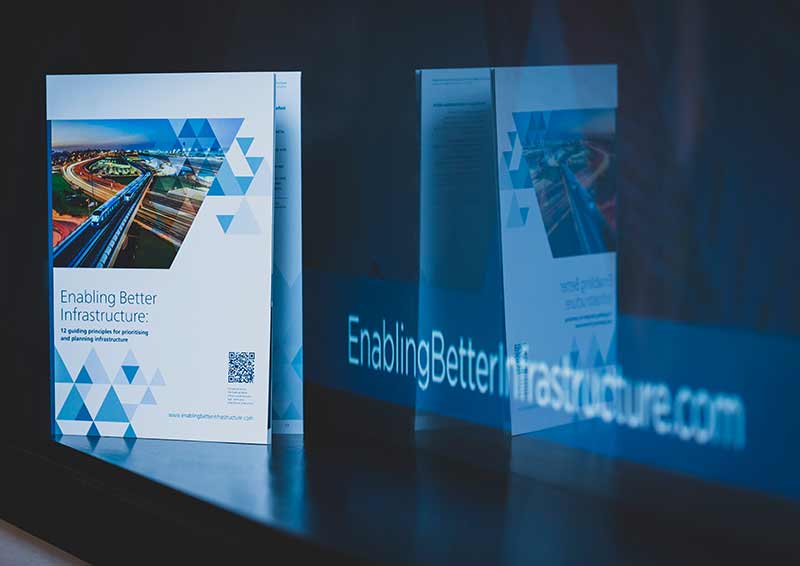A detailed look at the ICE Enabling Better Infrastructure programme

|
| During December 2019, the ICE put a significant amount of effort into launching its new Enabling Better Infrastructure programme around the world, with seven separate launch events in five different continents. Here Ben Goodwin examines the detail behind the key aims of the programme. |
Contents |
[edit] Outline
As previously detailed through ICE's Infrastructure Blog, the primary outputs of the programme include a report, that outlines 12 guiding principles for prioritising and planning infrastructure, and a resource hub that showcases examples of international best practice across the breadth of the infrastructure delivery cycle.
The purpose of both of these is to direct national governments and key decision-makers towards potential solutions to the challenges that they are facing in developing and delivering effective infrastructure strategies.
But, how exactly do they do this?
[edit] The 12 guiding principles for prioritising and planning infrastructure
The principles relate to a range of insights gathered from interviewing decision-makers and practitioners, both from the UK and internationally. Taken together, these form a useful reference tool for improving infrastructure provision primarily at the national level.
The initial principles refer to the need to identify the strategic objectives that infrastructure can contribute to - be they economic, social or environmental. The United Nations’ Sustainable Development Goals are drawn upon in this context to highlight the significant role that infrastructure can play in their realisation.
Progressing through the principles, the next set relates to positioning infrastructure within the context of a wider national vision. This includes determining what is required across a nation’s infrastructure networks to achieve that vision, supported by advice on how to put together a comprehensive and long-term strategy to enable this to happen.
Other principles set out the advantages of undertaking a form of cost-benefit analysis for project selection that avoids fixating on lowest capital cost and instead seeks to achieve long-term value. Engaging the private sector to ensure that a national infrastructure strategy is affordable is also identified as a guiding principle, as are engaging the public on their priorities and backing-up key investment decisions with the use of quality data.
[edit] The resource hub
The primary goal of the resource hub is to facilitate knowledge sharing and the exchange of good ideas, rather than be overly prescriptive. After all, it is important to recognise that the different political and economic systems that exist around the world mean that a ‘one-size fits all’ approach will not suffice.
The hub contains case studies that have been sourced from a range of governments, delivery bodies and other organisations allied to the infrastructure planning and delivery environment.
Unlike the report, the hub covers best practice from right across the infrastructure lifecycle. Taking in prioritisation and planning, it also includes examples related to project preparation, delivery, operation and finally project decommissioning.
The objective for 2020 is to continue to populate the resource hub with useful and interesting content. Readers who would like to contribute are kindly asked to ice.org.uk get in touch.
[edit] Engaging with these outputs
Feedback from ICE's programme launch events was overwhelmingly positive. There is clearly appetite for what ICE is doing. However, the critical next step is to build on this momentum and to ensure that it is not lost.
The ICE team, along with its project partners, are already busy planning activities for next year to ensure that this happens. Readers who would like to contribute to the ongoing programme should get in touch at ice.org.uk enablingbetterinfrastructure@ice.org.uk.
[edit] About this article
This article was written by ice.org.uk Ben Goodwin, ICE Lead Policy Manager. It was first published on the ICE website in December 2019 and can be accessed HERE.
Other articles by the ICE on Designing Buildings Wiki can be accessed HERE.
[edit] Related articles on Designing Buildings Wiki
- Brexit - The case for infrastructure.
- Career development for infrastructure leaders.
- Civil engineer.
- Community infrastructure levy.
- Government construction and infrastructure pipelines.
- Green infrastructure.
- Growth and Infrastructure Act.
- Hyperloop
- Infrastructure and Projects Authority.
- Infrastructure UK (IUK).
- Infrastructure nationalisation.
- Insights from New York on the Enabling Better Infrastructure guiding principles.
- London infrastructure plan.
- National Infrastructure Pipeline.
- National Infrastructure Plan.
- Nationally Significant Infrastructure Projects.
- Railway engineering.
- Smart cities.
- Traffic and transport.
Featured articles and news
Inspiring the next generation to fulfil an electrified future
Technical Manager at ECA on the importance of engagement between industry and education.
Repairing historic stone and slate roofs
The need for a code of practice and technical advice note.
Environmental compliance; a checklist for 2026
Legislative changes, policy shifts, phased rollouts, and compliance updates to be aware of.
UKCW London to tackle sector’s most pressing issues
AI and skills development, ecology and the environment, policy and planning and more.
Managing building safety risks
Across an existing residential portfolio; a client's perspective.
ECA support for Gate Safe’s Safe School Gates Campaign.
Core construction skills explained
Preparing for a career in construction.
Retrofitting for resilience with the Leicester Resilience Hub
Community-serving facilities, enhanced as support and essential services for climate-related disruptions.
Some of the articles relating to water, here to browse. Any missing?
Recognisable Gothic characters, designed to dramatically spout water away from buildings.
A case study and a warning to would-be developers
Creating four dwellings... after half a century of doing this job, why, oh why, is it so difficult?
Reform of the fire engineering profession
Fire Engineers Advisory Panel: Authoritative Statement, reactions and next steps.
Restoration and renewal of the Palace of Westminster
A complex project of cultural significance from full decant to EMI, opportunities and a potential a way forward.
Apprenticeships and the responsibility we share
Perspectives from the CIOB President as National Apprentice Week comes to a close.
The first line of defence against rain, wind and snow.
Building Safety recap January, 2026
What we missed at the end of last year, and at the start of this.























